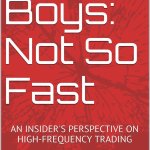Peter Kovac wrote Flash Boys: Not So Fast, as a point-by-point refutation of the major premises of Michael Lewis’ Flash Boys. At the end of Kovac’s book – well actually, after just the first few pages – you’re left with the strong impression that Lewis wrote a tale built on speculation about a dramatic – but not particularly true – conspiracy theory about high frequency trading (HFT) and the US equity markets.
I’m reminded of a core reason I started Bankers Anonymous
After the 2008 crisis I got tired of reading the journalistic errors and omissions about mortgage bonds and credit default swaps. Having worked in those markets, I know how frustrating it can be to read some overly simple or mostly false journalistic narrative in the New York Times or Wall Street Journal.
I would think: “No! That’s not how it works.”
Then I’d end up shouting at the breakfast table, angrily poking the newspaper,[1] scaring my small daughters and leaving my wife eager to get to work as quickly as possible.
That’s one of the reasons I started Bankers Anonymous. To offer better explanations. The other reason was to maybe learn how to write a book.
Speaking of writing a book. Can I admit to a bit of jealousy?[2]
Kovac is a friend. Until recently he worked for a high frequency trading firm. When he read Michael Lewis’ Flash Boys, the errors and omissions about his industry bugged him so much that he decided to write a response.
A few months and 115 pages later, he has written the definitive take-down of Flash Boys.
Kovac is funny, informed, and he has specific examples and excellent metaphors to make the somewhat opaque world of high frequency trading accessible to us.
Who is Pete Kovac?
Kovac’s biography is a key to understanding his response to Michael Lewis’ book.
He started as a programmer for his HFT firm, named EWT, in 2003 and then rose to Chief Operating Officer, overseeing everything from compliance and working with regulators. I’ve footnoted a fuller description of Kovac’s bio here.[3]
As Kovac himself points out, you could read his biography and immediately think: “Oh, just one of those insiders, defending his own industry.”
Naturally, one of the inherent problems of understanding finance is that the experts tend to have a stake in the system somewhere. Outsiders, with no stake, tend to not be experts. Well, Kovac’s an expert and an insider. That seems relevant when evaluating an outsider’s claim about an industry.
Nevertheless, most importantly, he’s the kind of expert that Lewis didn’t consult in the course of writing Flash Boys.
Lewis’ problem in Flash Boys
Lewis’ key advantage over most other financial journalists has always been his semi-insider status. Meaning, he actually worked as a salesman on the Solomon bond-trading floor for two years, and he actually understands the mindset and motivations of the Street better than most scriveners.

And yet, the biggest problem I found with Flash Boys is that he seems to have had no access to actual high frequency traders, making him far more outsider than insider this time. This makes his theories on HFT more speculative than they ought to be. In my earlier review of the book, I felt his lack of specific information or details or access on HFT led him to demonize and simplify their actions.
In his earlier books, the ‘bad guys’ tended to be at least humorous and specifically obnoxious, not facelesslessly manipulative and devious. Unfortunately the HFTs of Flash Boys are more faceless cartoon villains than real villains.
In addition to Kovac, other reviewers of Flash Boys have also pointed out the unusual number of either 1. errors or 2. simplification of equity markets and HFT. Again, Lewis’ lack of access to real live HFTs probably accounts for both.
Are HFT engaged in a vast front-running conspiracy against slower investors?
You kind of have to read Kovac’s full refutation of the vast conspiracy, and also know something about market structures and market orders to follow this, but I trust that – at the very least – Lewis was speculating about how front-running by HFTs might work. But Lewis didn’t really have any idea what would work or not.
Kovac goes point by point to show that Lewis’ speculation is basically impossible and nobody Kovac’s ever worked with in the HFT world could make money that way.
In addition – and this is probably the strongest part of Kovac’s book – Lewis’ description of what might have happened is so rife with errors or impossibilities according to the way the US equity market actually works that Kovac is left stunned.
Reading Kovac’s book I’m reminded of me, poking angrily at the morning paper “NO! It can’t happen that way! I can’t believe you’re claiming this and non-financial readers won’t know how to see through your BS! Argh!”
What about Brad Katsuyama, the hero of Flash Boys?
Kovac is sharp-witted about the incredulousness of Brad Katsuyama, the protagonist of Flash Boys. Katsuyama set out to create a (relatively) slow-trading exchange in order to foil the HFTs.

Katsuyama repeatedly appears to believe in HFT actions and schemes that have little basis in the markets Kovac knew and participated in.
Far from a hero to Kovac, Katsuyama represents the legacy model of trading equities – expensive, slow, and self-interested.
When Katsuyama alleges a HFT front-running conspiracy that his new IEX exchange will correct, Katsuyama (in Kovac’s telling) becomes focused on his sales pitch even though his new exchange may be a solution in search of a problem.
Worse, Lewis appears to swallow and then amplify Katsuyama’s sales pitch for IEX, despite data and evidence that refutes their central thesis.
Want to know what else is wrong with Flash Boys?
Kovac’s book is a comprehensive, chapter-by-chapter, point-by-point critique of Lewis’ errors.
Here’s a few more examples that Kovac explains in detail.
Did Reg NMS in 2007 give rise to the machines as Lewis implied?
Nope, HFT was already 20% of the trading volume on US exchanges prior to 2007. As Kovac points out, Lewis himself provides this data that undermines his own argument. In addition, US equity trading is only one small portion of HFT trading strategies. The others, with currencies, commodities, bonds, and futures, are unaffected by Reg NMS.
Did HFTs cause the 2010 Flash Crash?
A comprehensive review by regulators found no evidence of this, but rather a series of compounding triggers from multiples sources in the equity markets. Lewis dismisses the regulators as either dupes or self-interested, but I trust Kovac’s closeness to that trading situation, his professional contact with regulators, as well as his careful reading of the report.
Is trading data impossible to track and assemble for the purposes of uncovering frontrunning or wrongdoing – or “does the data not exist” as Lewis claims?
Kovac reports that every single trade, in addition to every single text, instant message, trading program and order gets tracked and recorded by all the exchanges and regulators. It would be, and is, possible to track bad behavior from HFTs, says Kovac, who has served in the compliance role at his firm.
Lewis makes the claim that tracking this would be impossible.
On a related note, Lewis paints market regulators as generally either compromised or behind the curve when it comes to regulating markets and high frequency traders in particular. Kovac, who worked professionally with many regulators over the years, found the opposite to be true.
Kovac compares them to the Supreme Court. They often passed judgment he disagreed with, but they were always thoughtful. Regulators laid out extensive reasoning for their decisions, and attempted to create fair markets for the general good.
Criticisms of Kovac’s book
Readers unfamiliar with Lewis’ Flash Boys may not follow along with Kovac’s rebuttals, as he takes a chapter-by-chapter approach to critiquing Flash Boys. It’s undoubtedly more interesting to read this if you already know the original work.
In addition, while Kovac is quite clear in his writing, there are moments of technical explanations – I’m thinking of the explanations of market orders as one example – in which I got lost a bit in the weeds. Less financially-savvy readers may suffer somewhat as well.
Finally, at times Kovac is so astonished by Lewis’ one-sidedness with the HFT narrative that he lapses into sarcasm.
When I’m really mad at someone or something I do this too, so I recognize it in Kovac’s writing as well. It doesn’t happen much with Kovac, but I can hear my own internal editor telling me “don’t do that.”
Final Analysis
As a result of Kovac’s book, I’m convinced that Lewis pretty much blew it in covering the HFT story. I’m still left with some questions – for example ‘how do HFTs really make consistent profits?’ and ‘should we be collectively worried about future flash crashes as a result of algorithmic trading, and how do we prevent that?’
But if you really liked and believed in Lewis’ narrative, you owe it to yourself to hear another side, from someone who actually knows the business.
Please see related post: All Bankers Anonymous book reviews in one place!
Please see related posts:
Book Review of Flash Boys by Michael Lewis
Book Review of Inside The Black Box by Rishi Narang
Would You Like to Understand High Frequency Trading?
[1] Yes, I subscribe to physical newspapers. Yes, kids, I was born when dinosaurs roamed the earth, during the late Mesozoic Era, or Triassic Period. Ha ha ha. Now shut up and keep scrubbing.
[2] File this jealousy under the label “Every time a friend succeeds, a little something in me dies.” I’ve been talking about writing a book for a while now, and he just goes out and does it. And it’s good! Damn him. *Shaking my fist.
[3] In Kovac’s own words: “I am an industry insider, the kind of person who could have saved Lewis from making some really basic mistakes. I started programming trading strategies in 2003. After years in the trenches, I moved into management and ultimately became chief operating officer of my firm, EWT. I handled regulatory compliance, risk management, finance, trading operations, and a portion of the IT and software development teams – and I had to know every aspect of the stock market inside and out. By 2008, our company was one of the largest automated market-making firms in the U.S., trading hundreds of millions of shares of stock daily, and had expanded into many other asset classes domestically and internationally. I left it all three years ago when EWT was sold to Virtu Financial (in which, in the interest of full disclosure, I still retain a small stake).
Those eight years at EWT provided me with a front row seat to all the events described in Flash Boys, and much more. During that time, I shared my experience and perspective in discussions with regulators and lawmakers here and abroad, advocating for the continued improvement of the markets discussed in the book. Many of my comment letters on these topics are publicly available on the SEC website. Even though I no longer work in trading, I can still get answers from a diverse set of close sources when a truly new question arises.”
Post read (4801) times.










8 Replies to “Book Review: Flash Boys: Not So Fast by Pete Kovac”
I haven’t read Kovac’s book yet, but I was at EWT for 2-1/2 years and I worked on some projects with him. He is thoughtful and detail oriented and he always did the right thing, regardless of the egos he might bruise along the way. I suspect he brings the same attitude to his book. I am looking forward to reading it.
Daniel, thanks for reading the post…I suspect you will appreciate the book. It’s well argued and funny too. I will be following up with some podcast interviews with Pete in the next few weeks.
How did you meeting go? I would very much like to get your thoughts on this review of Kovac’s book.
http://www.amazon.com/gp/cdp/member-reviews/A17YLKFHLXDMDO/ref=pdp_new_read_full_review_link?ie=UTF8&page=1&sort_by=MostRecentReview#R28Y8AI4PIPYZ2
Thanks!
Thanks for linking to that. Everybody should make their own conclusions about Flash Boys, Flash Boys:NSF, and these reviews, but what stands out about that review is that the guy (I assume its a guy, maybe I’m wrong) only read the introduction, and then says ‘I put my Kindle down’ and didn’t read any further. It’s not the most reliable way to review a book. His criticisms of Kovac’s book are of some ‘scene setting’ historical descriptions of changes in equity markets over the last few decades which he finds either exaggerated or errors. Fine, he has a point. But since he hasn’t actually read the book he seems unqualified to comment much on Flash Boys:NSF, or perhaps more importantly – because it was more widely read – Flash Boys itself.
If you think Kovac is not bias, you’re dead wrong. Lewis book destroyed the IPO for Virtu, and thus Billions (not millions) of dollars lost. By his own admission, Kovac still owns a stake in Virtu and he personally stands to make millions when(if) virtue IPO occurs. that is his motivation to debunk Flash Boys. I am also an HFT insider, I’ve been on both sides since 1997 and I know and have worked with many of the names in these books personally. I encourage the writer of this article to reach out to me so you can have the true facts.
I enjoy your website. If I use limit orders, shouldn’t that protect against the price problems Lewis discusses? Or is Lewis saying that I could have set limit orders lower if HFT didn’t exist?
I believe you, DL, not Mr. Kovac. The latter is the archetypal sore loser whose illicit “earnings” are being jeopardized by the truth as revealed in Mr. Lewis’s book.
Limit orders do not work. Your order will simply not be executed unless the price subsequently falls sufficiently for the high-freq. trader to earn his illicit kickback.